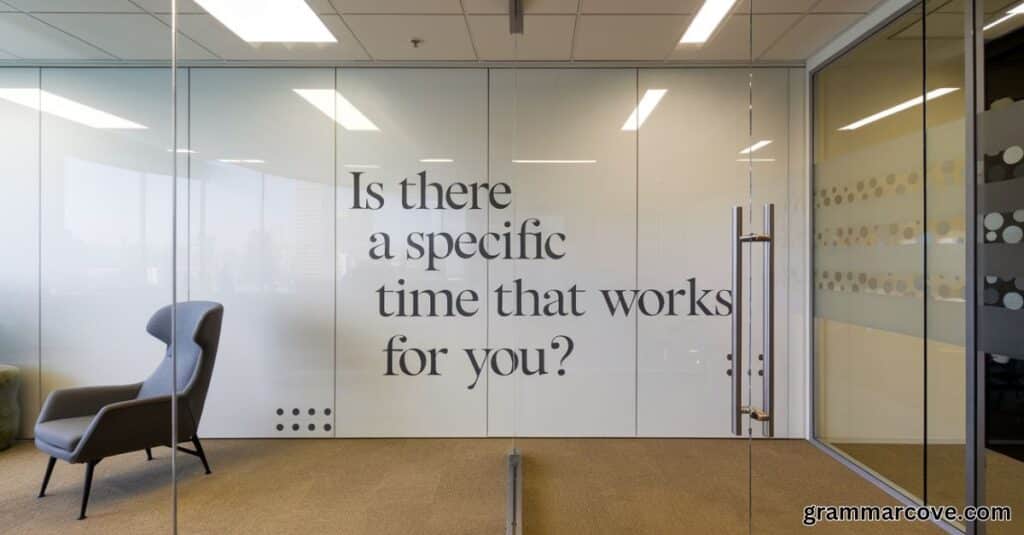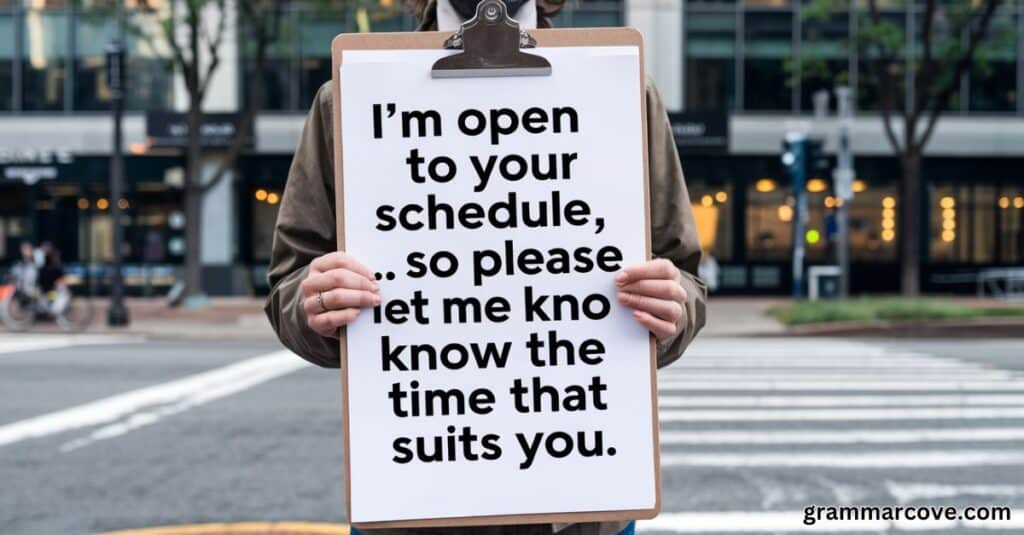Introduction
In the fast-paced world of professional communication, scheduling a meeting or arranging appointments often requires a polite inquiry about the other party’s availability. A direct question like “What time suits you best?” can often come across as too casual or abrupt, especially in formal or business environments. It’s essential to frame such a question with respect and politeness to maintain a professional tone, whether you’re setting up client consultations, project meetings, or any other business engagements.
In this article, we will explore 20 formal ways to ask, “What time suits you best?” and provide detailed explanations and scenario examples for each method. These phrases will help you ensure that your communication is polite, clear, and professional, all while effectively coordinating meeting logistics.
List Of Formal Ways to Ask “What Time Suits You Best?”
- Which time is most convenient for you?
- I would appreciate it if you could tell me what time works best.
- What time should we arrange this?
- Is there a specific time that works for you?
- Do you have a time in mind?
- Could I request a time that works for your schedule?
- I would like to work this around your schedule.
- Please let me know when you have a free slot.
- Please tell me when you’re available.
- May I ask for your preferred time for our meeting?
- What time would be ideal for you to meet?
- I’m open to your schedule, so please let me know the time that suits you.
- I would like to schedule our meeting at a time that suits you. Could you share that with me?
- May I inquire about the time that works well for you?
- What time is most preferable for our appointment?
- Could you kindly inform me of the time that is most suitable for you?
- May I ask for the time that fits into your schedule?
- I’m flexible, so please share the time that suits you.
- What time would be optimal for you?
- May I know the time that suits you the best?
1. Which time is most convenient for you?
This phrase is a direct yet polite way of asking for the recipient’s preferred meeting time. It implies that you’re flexible and ready to accommodate their availability.
Scenario (Email):
Dear Ms. Patel,
I’d like to discuss the upcoming project proposal. Which time is most convenient for you this week?
Best regards,
Tom Harrison
By using the word “convenient,” you’re showing respect for their schedule and signaling that you value their time.
2. I would appreciate it if you could tell me what time works best.
This phrase has a polite and formal tone, with an expression of appreciation that makes the request sound thoughtful and respectful.
Scenario (Email):
Dear Mr. Roberts,
We need to finalize the project timeline. I would appreciate it if you could tell me what time works best for a call this week.
Warm regards,
Sarah Davis
By expressing appreciation, you show your professional etiquette, giving the recipient a sense that you respect their input.
3. What time should we arrange this?
This is a straightforward way of asking for a suitable meeting slot without sounding too informal. It works well in both internal and external communications.
Scenario (Internal Communication):
Hey Mark,
Let’s arrange a quick call to go over the reports. What time should we arrange this?
Thanks,
Anna
This direct phrasing ensures clarity while maintaining a level of professionalism.
4. Is there a specific time that works for you?

Using the word “specific” indicates that you’re open to the other person’s schedule, inviting them to share their availability. In this article, we’ll explore formal ways to ask what time suits you best, ensuring your request is both respectful and clear.
Scenario (Email):
Dear Dr. Wright,
I’d like to discuss the research results. Is there a specific time that works for you on Thursday?
Kind regards,
Emily Clark
The request is polite and indicates flexibility, leaving room for their input and insights.
5. Do you have a time in mind?
This phrase is casual but polite and works well when you’re already in the process of scheduling with someone.
Scenario (Client Meeting):
Dear Mr. Brown,
We need to meet to discuss the final draft. Do you have a time in mind for this week?
Best,
David
The phrase is flexible and leaves the decision-making to the other person.
6. Could I request a time that works for your schedule?
This phrasing is more formal and emphasizes the recipient’s availability and convenience.
Scenario (Professional Email):
Dear Ms. Lopez,
I’d like to set up a consultation. Could I request a time that works for your schedule?
Thank you,
Rachel Johnson
It reflects a sense of professional courtesy, acknowledging the importance of their schedule.
7. I would like to work this around your schedule.
This phrasing shows you are willing to accommodate their schedule completely, reflecting a high degree of flexibility.
Scenario (Client Communication):
Dear Mr. Smith,
I’m available for a follow-up meeting this week. I would like to work this around your schedule. Please let me know your availability.
Best,
Laura Green
This phrase reinforces your willingness to collaborate and prioritize their convenience.
8. Please let me know when you have a free slot.

This phrase indicates that you respect their busy schedule and are ready to find a convenient meeting schedule based on their availability.
Scenario (Business Email):
Hi Catherine,
I’d like to meet regarding the upcoming campaign. Please let me know when you have a free slot.
Thanks,
James
The term “free slot” makes the message light yet professional, and it shows that you respect their schedule.
9. Please tell me when you’re available.
This is a direct and professional way of requesting their availability, without sounding too pushy.
Scenario (Internal Team Email):
Hi Alex,
We need to discuss the new marketing strategy. Please tell me when you’re available this week.
Thanks,
Megan
This straightforward phrasing ensures clarity while maintaining a respectful tone.
10. May I ask for your preferred time for our meeting?
The word “preferred” softens the request, making it a polite inquiry. It indicates that you want to make the meeting work with their preferred time. In this article, we’ll explore formal ways to ask what time suits you best, ensuring your request is both respectful and clear.
Scenario (Client Email):
Dear Mr. White,
I would like to set up a meeting to discuss the contract. May I ask for your preferred time for our meeting next week?
Best regards,
Sophia Moore
The term “preferred” gives the recipient the power to set the optimal appointment time.
11. What time would be ideal for you to meet?
This phrasing adds an extra level of politeness by using the word “ideal,” suggesting that you’re looking to make the meeting fit perfectly into their day.
Scenario (Formal Communication):
Dear Mr. Johnson,
I would like to discuss the recent updates. What time would be ideal for you to meet?
Kind regards,
Michael Carter
By asking about the ideal time, you convey that you’re willing to be flexible and accommodating.
12. I’m open to your schedule, so please let me know the time that suits you.

This is a very open-ended and accommodating phrase that allows the other person full control over the timing.
Scenario (Client Request):
Dear Ms. Campbell,
I’d like to arrange a follow-up meeting. I’m open to your schedule, so please let me know the time that suits you.
Warm regards,
Jessica Allen
This phrase is especially useful when dealing with busy clients who need full flexibility.
13. I would like to schedule our meeting at a time that suits you. Could you share that with me?
This phrase is particularly useful when you’re trying to arrange a meeting time that is mutually beneficial. It conveys both professionalism and consideration.
Scenario (Email Request):
Dear Mr. Hernandez,
I would like to schedule a meeting to go over the project progress. Could you share a time that suits you?
Best regards,
William Stevens
It reflects politeness and flexibility while ensuring clear communication about the recipient’s availability.
14. May I inquire about the time that works well for you?
This is a formal and polite way to ask for someone’s availability while indicating that their preference is important to you.
Scenario (Formal Business Email):
Dear Ms. Evans,
I’d like to schedule a discussion on the upcoming client presentation. May I inquire about the time that works well for you this week?
Kind regards,
John Adams
Using “may I inquire” makes the phrasing respectful and professional.
15. What time is most preferable for our appointment?
This phrase gives the recipient the freedom to select their most convenient time, demonstrating flexibility.
Scenario (Professional Setting):
Dear Mr. Jackson,
I would like to set up an appointment to discuss the contract. What time is most preferable for you?
Best regards,
Lily Brooks
The use of “preferable” creates a polite tone that invites the recipient’s input.
16. Could you kindly inform me of the time that is most suitable for you?

This is a highly formal and respectful phrasing, perfect for situations where you’re communicating with someone senior or a client.
Scenario (Client Email):
Dear Dr. Lee,
I’d like to discuss your feedback. Could you kindly inform me of the time that is most suitable for you next week?
Warm regards,
Sarah Jenkins
This phrase emphasizes respect for the recipient’s schedule and suggests that you’re highly flexible.
17. May I ask for the time that fits into your schedule?
The word “preferred” softens the request, making it a polite inquiry. It indicates that you want to make the meeting work with their preferred time. This polite inquiry shows that you’re ready to fit the meeting into their already busy schedule, reflecting respect and consideration. In this article, we’ll explore formal ways to ask what time suits you best, ensuring your request is both respectful and clear.
Scenario (Professional Inquiry):
Dear Ms. Martinez,
I’d like to go over the quarterly financials. May I ask for the time that fits into your schedule this week?
Best regards,
Charles Thompson
This request demonstrates politeness and flexibility while asking for availability.
18. I’m flexible, so please share the time that suits you.
This phrase shows that you’re accommodating and willing to adapt to their schedule. It is polite and invites collaboration.
Scenario (Business Proposal):
Dear Mr. Davis,
I would like to schedule a call to review the project proposal. I’m flexible, so please share the time that suits you.
Best,
Rebecca Harris
The term “I’m flexible” reflects professional courtesy, while the rest of the phrase keeps it respectful.
19. What time would be optimal for you?
This phrase is formal and polite, showing that you’re open to the recipient’s optimal time for the meeting.
Scenario (Client Communication):
Dear Ms. Mitchell,
I would like to schedule our next discussion. What time would be optimal for you this week?
Warm regards,
James Walker
The use of “optimal” conveys that you’re trying to make things as convenient as possible for the other person.
20. May I know the time that suits you the best?
This is a direct but polite way of asking for their availability while emphasizing the importance of fitting the meeting into their schedule.
Scenario (Business Email):
Dear Mr. Clarke,
We need to finalize the upcoming project. May I know the time that suits you the best this week?
Best regards,
Emily Taylor
This phrase is direct but polite, and the phrase “suits you the best” adds a level of respect and flexibility.
Conclusion
Asking about someone’s availability for a meeting requires a balance of politeness and professionalism. Each of the 20 ways discussed in this article offers a different tone and approach to ensure that your request is courteous and flexible, regardless of the context. Whether you’re communicating with clients, colleagues, or managers, using the appropriate phrasing will help you maintain a professional image and ensure that your scheduling requests are well received.


